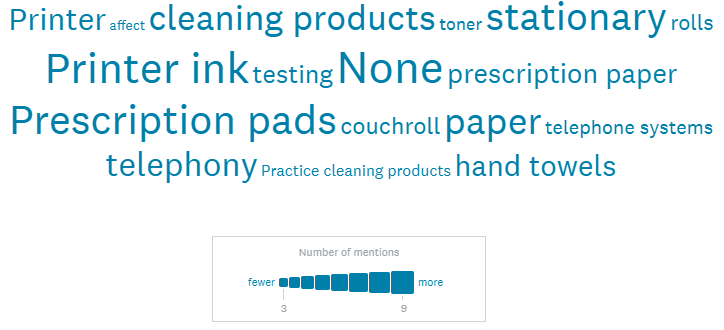EU Exit Planning: Non-Clinical Goods and Services
![]() Thank you for responding to our recent survey on practice needs in the event of a no-deal Brexit. We rely on your input.
Thank you for responding to our recent survey on practice needs in the event of a no-deal Brexit. We rely on your input.
Following a discussion at our Annual General Meeting on Thursday 24 January, we asked you about the impact of a no-deal EU exit on your practice-critical Non-Clinical Goods and Services (NCGS). Medical devices, clinical consumables and medicines are being considered separately.
We asked you to consider:
- The dependency of those goods/ services on that front-line service;
- The criticality of that front-line service and its clinical importance; and
- Outsourced services such as equipment maintenance.
We had a really good response and have been able to advise officials about supply concerns across London in good time. Whilst there were a number of respondents who are unconcerned about the impact of no-deal Brexit, those who do harbour concerns highlighted a number of non clinical products and services which they fear might be affected. These include:
- Stationary;
- Printer ink;
- Prescription pads;
- Couch roll;
- Paper;
- Telephony;
- Cleaning products;
- Prescription paper;
- Printer;
- Hand towels;
- Testing;
- Telephone systems;
- Practice cleaning products; and
- Toner.
We will continue to work with officials to identify and anticipate the impact of Brexit on London general practice, be it no-deal or otherwise. Other possible EU exit risks include:
- Goods or services that have supply chain touch points in the EU;
- Personal data held in EU member countries;
- Supply routes into the UK via Dover/ Calais; and
- Dependencies on EU regulations.
If you have any comments or questions about this work, please contact us.
This word cloud gives some indication of respondents' concerns.

Mword - Issue 33 - A bit of politics (02 Jun 2017)
Are you a digital healthcare provider? Have you registered? (24 May 2017)
The use of technology to deliver regulated activities remotely is increasing significantly with the intention of improving people’s access to healthcare advice, diagnosis and treatment. Practices need to be aware...2016/17 NHS complaints procedure KO41b - important action required (24 May 2017)
Practices have until 7 June 2017 to submit details of complaints associated with their NHS work, prior to it being published on the NHS England Primary Care website. This...Our latest workforce survey is live next week (24 May 2017)
Thank you in advance for making space in your hectic day to complete our short survey on practice workforce issues which will help us to gather insight to share with...Guest blog - How the Lambeth nurse leads model works (24 May 2017)
Paula Marsden, Anne Macrae and Louise Ashwood explain how they set up the Lambeth nurse leads. A group which supports nurses working in general practice within the borough. In May...Londonwide LMCs' May 2017 newsletter (24 May 2017)
Be safe! Take care of your cyber security (24 May 2017)
We know that the security of your practice IT systems is often out of your hands. However, we have put together some tips that may help you secure your systems...BMA service charge problems data collection (22 May 2017)
The BMA are asking practices in NHS Property Services (NHSPS) or Community Health Partnership (CHP) premises to return the appropriate form (below) to provide details of any problems they may...Press release - Patient power bid to ease pressure on GPs (17 May 2017)
A hard-hitting video for practice waiting rooms aims to enlist patient power by showing just how much pressure GPs are under. Part of Londonwide LMCs’ GP State of Emergency,...Londonwide LMCs' Annual Conference calls for new models of care to stay true to the values of general practice and ease pressure on GPs (03 May 2017)
On 27 April 2017 we held our annual conference – ‘Under Pressure: stabilise, transform and sustain general practice for London’. The day provided a an opportunity for leaders in the...Guidance
We provide expert guidance for practices in our guidance section, as well as an archive of other materials you may find useful.
GP Support
Contact our GP Support team if you need help or advice.
The team provide professional and pastoral support to GPs and practice teams on a broad range of issues.

